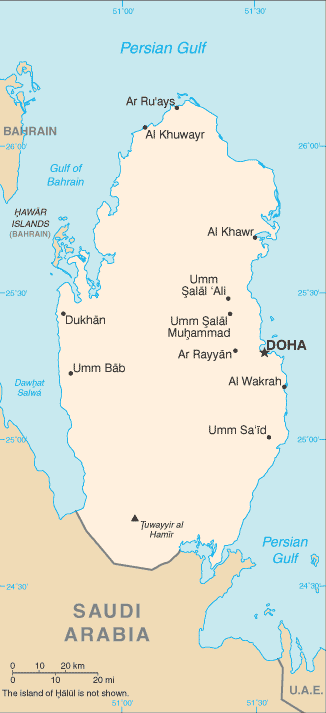| Qatar 
The State of Qatar is an emirate in the Middle East. Situated on a small peninsula off the larger Arabian Peninsula, it borders Saudi Arabia to the south and is otherwise surrounded by the Persian Gulf. Qatar is one of many new emirates in the Arabian Peninsula. After being dominated by Persians for thousands of years and recently by Bahrain, the Ottoman Turks, and the British, Qatar became an independent state on September 3, 1971. Unlike most neighbouring emirates, Qatar declined to become part of either the United Arab Emirates or Saudi Arabia. Although the peninsular land mass that makes up Qatar has sustained human development for thousands of years, for the bulk of its history the arid climate fostered only short-term settlements by nomadic tribes. Bearing tribal monikers such as the Al Khalifa and the Al Said that would later descend upon the thrones of Bahrain and Saudi Arabia respectively, these clans swept through the Arabian peninsula and camped on the coasts within small fishing and pearling villages. The clans battled each other for lucrative oyster beds and lands, frequently forming and breaking coalitions with one another in efforts for territorial supremacy. The British initially sought out Qatar and the Persian Gulf as an intermediary vantage point for their colonial interests in India, although the discovery of oil and hydrocarbon some hundred years later would reinvigorate their interest. During the 1800s, the time of Britain’s formative ventures into the region, the Al Khalifa clan reigned over the Qatari peninsula from the off-shore island of Bahrain. Although Qatar was legally a dependency, resentment festered against the Bahraini Al Khalifas along the eastern seaboard in the fishing villages of Doha and Wakrah. In 1867 the Al Khalifas launched a successful effort to quash the Qatari rebels by sending a massive naval force to Wakrah. Bahraini aggression however violated an 1820 Anglo-Bahraini Treaty and the diplomatic response of the British Protectorate set into motion the political forces that would eventuate into the state of Qatar. In addition to censuring Bahrain for its breach of agreement, the British Protectorate Colonel Lewis Pelly asked to negotiate with an actor from Qatar. The request carried with it a tacit recognition of Qatar’s status as distinct from Bahrain. The man chosen to negotiate with Colonel Pelly was a respected entrepreneur and long-time resident of Doha, Muhammed bin Thani. Muhammed’s clan, the Al Thanis, had been relatively inactive in Gulf politics but the diplomatic foray ensured future participation and dominion as the ruling family, a dynasty that continues to this day. The negotiation results left Qatar with a newfound sense of political self although it did not gain official standing as a British protectorate until 1916. The Second World War dampened Britain’s old aspirations of a global Empire, especially when India became independent in 1947. Momentum for a similar withdrawal from the Gulf emirates increased during the 1950s and the British welcomed Kuwait’s declaration of independence in 1961. Seven years later when the British officially announced that it would disengage (politically, not economically) from the Gulf in three years, Qatar joined Bahrain and seven other Trucial States in a federation. Regional disputes however quickly compelled Qatar to resign and declare independence from the coalition that would evolve into the seven-imarat United Arab Emirates. Thus 1971 marked the inauguration of Qatar as an independent sovereign state.
As of 2005, Qatar is ruled by Emir Hamad bin Khalifa al-Thani, who seized control of the country from his father Khalifa in 1995 while the old Emir was on vacation in Switzerland. Under Emir Hamad Qatar has experienced a notable amount of sociopolitical liberalisation, including the enfranchisement of women, a new constitution and the creation of Al Jazeera, the controversial Arabic satellite television news channel. Click here to go back to the Middle East Page!This article is licensed under the GNU Free Documentation License. It uses material from the Wikipedia article "Qatar".
|
|||||||||||